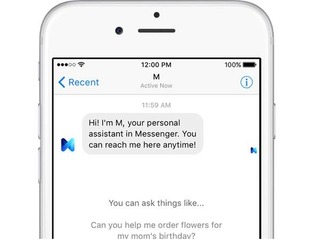M&A activity in the warehouse robotic space
Robots are taking over the heavy lifting work inside warehouses
Read more...
Elon Musk, may be the real life Iron Man, but it's another tech billionaire that is planning to build his own J.A.R.V.I.S. That apparently stands for "Just A Rather Very Intelligent System," which is something I literally just found out.
Every year Mark Zuckerberg comes up with a big goal for the oncoming year. In 2014 that was to learn Mandarin, which he apparently did pretty well at. Last year it was to read two new books every month, allowing the Facebook community to join in.
This year, he's going a bit bigger, revealing in a Facebook post on Sunday that his goal for 2016 is to "build a simple AI to run my home and help me with my work."
The process will start, he said, by "exploring what technology is already out there," which will be followed by Zuckerberg teaching the... what are we calling this? His assistant? Sure, let's go with that. He will teach his assistant to control the entire house based on Zuckerberg's voice commands.
"I'll teach it to let friends in by looking at their faces when they ring the doorbell. I'll teach it to let me know if anything is going on in Max's room that I need to check on when I'm not with her. On the work side, it'll help me visualize data in VR to help me build better services and lead my organizations more effectively," Zuckerberg wrote.
This isn't a really surprising move, considering that Zuckerberg has trying to be on the cutting edge of both artificial intelligence and virtual reality. Facebook recently released a new AI-driven mobile assistant called M.
With M, users can send it a note in exactly the same way they send messages to other users, asking it questions. M can then ask followup questions in the message thread, and send updates as the task is completed.
Here's the most interesting part: with M there is always going to be a person behind each message, who will be able to help out when the computer has trouble. Therefore, users will never know if they were helped by a compute, or if a person has stepped in to assist.
Of course, not everyone is as enamored with the idea of artificial intelligence as Zuckerberg is.
people like Elon Musk and Stephen Hawking have both expressed with own fear and concern about it.
In an interview with the BBC, for example, Hawking once said that "the development of full artificial intelligence could spell the end of the human race."
"Once humans develop artificial intelligence it would take off on its own and redesign itself at an ever-increasing rate. Humans, who are limited by slow biological evolution, couldn’t compete and would be superseded," he said.
Musk, meanwhile, has been on the forefront of the the anti-AI movement for a while now, calling it the "biggest existential threat" to humanity.
Both of them signed a letter earlier this year, along with AI and robotics researchers, explicitly calling for the technology to never be used in warfare.
At our Post Seed event earlier this month, Vinod Khosla also talked about machine learning and automation, predicting that AI will cause steep income disparity.
"If you don't need farm workers on a farm, if you don't need hamburger flippers at a McDonald's restaurant, nobody to cook the food or take the orders. If don't need legal researchers in a law firm. If you don't need radiologists in a hospital. I'm purposely covering a very broad range," he said.
"Look all these functions. They're all easily automatable. And what I prophetize is more than 50 percent of jobs today will disappear. That's a problem because of the income disparity, or inequality, unless we do something large."
It's not AI taking over the world, per se, but it's also going to cause a big problem.
This technology is new, and it's scary to a lot of people, something that became a recurring theme across pop culture in 2015, with a slew of movies about AI backfiring on humanity. That includes one where Iron Man himself makes that very mistake.
Zuckerberg, however, is not dismayed. He sees big potential in this technology.
"At Facebook I spend a lot of time working with engineers to build new things. Some of the most rewarding work involves getting deep into the details of technical projects. I do this with Internet.org when we discuss the physics of building solar-powered planes and satellites to beam down internet access," he wrote.
"I do this with Oculus when we get into the details of the controllers or the software we're designing. I do this with Messenger when we discuss our AI to answer any question you have. But it's a different kind of rewarding to build things yourself, so this year my personal challenge is to do that."
Let's just hope that Zuckerberg doesn't go the same route as Iron Man and try to build his own Ultron as well. Because then we'll all really be in trouble.
Robots are taking over the heavy lifting work inside warehouses
Read more...The company also expanded access to 12 different provider types for male fertility care
Read more...Ezra's AI cancer screening platform will be available in 150 RAYUS locations
Read more...
